‘Care. No matter what’ isn’t a promise in Alabama, it’s a battle cry
In the first of a new series, Holly Baxter travels to Birmingham, Alabama, to speak to women who directly oppose the new abortion ban and those who’ve become victims of it
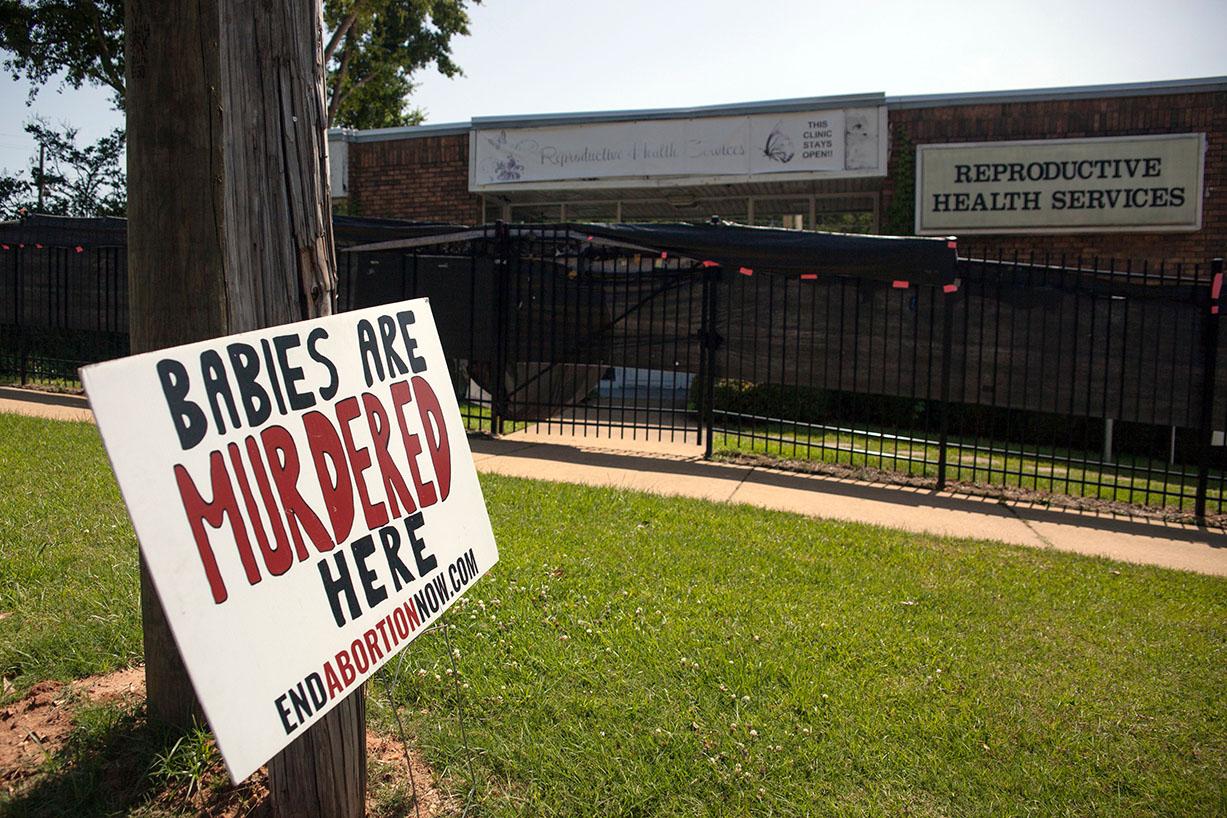
The first thing you see when you arrive at the airport in Birmingham, Alabama, is the face of Governor Kay Ivey. “Welcome to Birmingham,” the banner beside her smiling face reads, adding that Alabama is world-renowned for its natural beauty and its history. That may well be true, but as I arrive in the Yellowhammer State (so nicknamed for the woodpecker which populates much of the rural areas), Alabama is making headlines for a very different reason.
In May, Governor Ivey signed into law a near-total abortion ban disingenuously named the Human Life Protection Act. This piece of legislation, even more restrictive than other bills which have recently made the news (notably the “foetal heartbeat bill” in the neighbouring state of Georgia, which bans abortions after a foetal heartbeat is detectable on an ultrasound), banned all abortion except when a mother faces a “serious health risk” that can only be solved by a termination. It famously doesn’t allow exceptions in the case of rape or incest, and is so severe that it had come to be known as “the abortion ban”. It is due to come into effect in November.
Birmingham is an industrial city punctuated by high-rises and pickup trucks with “God bless America” license plates. Just under a third of residents live below the poverty line, with black women suffering the most income inequality. The city’s Planned Parenthood clinic, however – just one of three clinics in the entire state currently providing abortions – is situated in an obviously wealthy area. Past imposing clapperboard mansions and well-manicured lawns, the reproductive health clinic stands, complete with CCTV cameras, reinforced doors, thick blinds pulled across the windows and the defiant sign: “Planned Parenthood: Care. No matter what.”
Planned Parenthood is an organisation which attracts particular ire in the United States. Most Americans pay for private healthcare insurance through their jobs, but those on very low incomes quality for Medicaid or similar programmes; these programmes, which are propped up by taxpayer dollars, allow people to access services across the healthcare spectrum including contraception, STD testing and abortions.
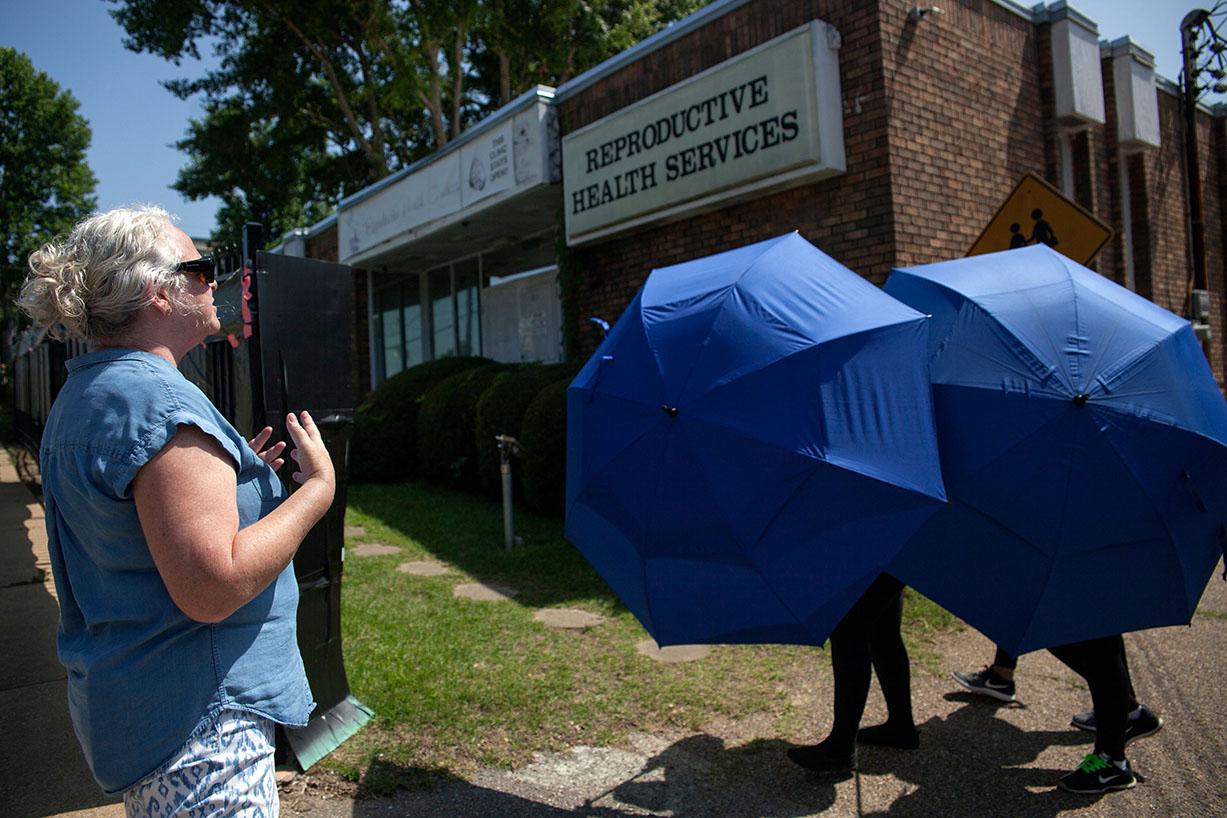
“Defund Planned Parenthood” has become a war cry for those opposed to abortions, including Donald Trump’s vice-president Mike Pence, who has introduced six federal measures attempting to take away all government funding from the organisation (he has also attempted to make a distinction between rape and “forcible rape” in legislation round abortion, and referred to condoms as ineffective and “too modern”.)
It’s not unusual to see pro-life protesters holding up mass-produced signs with “Defund Planned Parenthood” emblazoned upon them, and it’s not unusual either to encounter conspiracy theories which surround the organisation, including claims that they give out abortion pills in car parks, sell foetal parts, dump fully formed foetuses in trash cans outside clinics, or encourage depopulation of white or black people in America by providing abortions in certain areas. Although other reproductive health clinics do exist, Planned Parenthood is the largest and most recognisable organisation providing contraception and abortion in the US. If it were “defunded”, it’s been estimated that 60 per cent of the people who use its services would be left without any access to such healthcare provisions.
At Planned Parenthood Birmingham, there are no visible protesters on the afternoon I visit; and the only sounds along this quiet street are birdsong and a far-off lawnmower. I stop outside and take a picture of the sign – and it soon becomes clear that people are present, even if they’re not visible. After about five minutes, a grey-haired man, who looks to be in his sixties or seventies, pulls up beside me in a silver pickup truck. “Are you a counsellor here at the facility?” he asks me in a southern drawl.
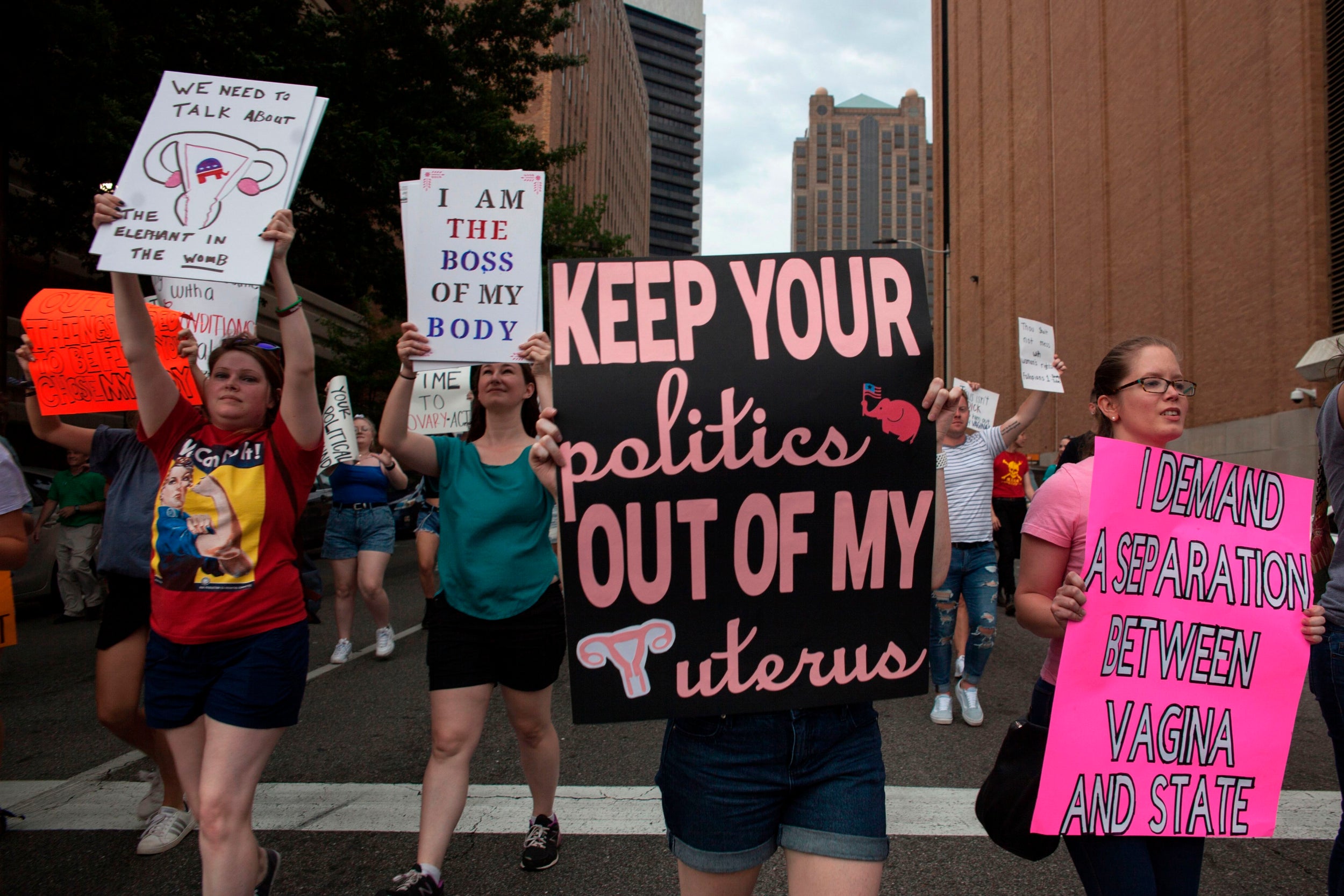
“No,” I say.
“You’ve been here a few minutes,” he says. “Saw you snap a picture.”
“Yes,” I say. “I’m a reporter for a newspaper. I’m covering the latest laws in Alabama and the existence of protesters outside clinics.”
For obvious reasons, people without appointments aren’t allowed into Planned Parenthood facilities, so I walk down the road and call the clinic to ask whether the man was affiliated with them. The woman at the end of the call isn’t surprised to hear what happened. “Protesters will often approach people [they think are going for abortions] to try to get more information out of them,” she says.
“So you think this was a protester, rather than anyone else?”
“Definitely,” she replies without hesitation. “For us, this is the usual.” Working for Planned Parenthood is difficult in this kind of environment, but she says she can’t say any more and directs me to a media spokesperson.
Knowing there are people watching, the quiet street suddenly feels eerie, so I move on. There are websites where anti-abortion protesters post the faces of people who work at Planned Parenthood or even the women who use the clinic’s services. Some post people’s faces and their licence plates; others post full addresses and encourage fellow anti-abortionists to go to their houses and “educate them”. “Care. No matter what” isn’t a casual promise; in states like Alabama, it’s a battle cry.
Because of the tensions surrounding the topic, there are few Birmingham residents who want to talk about having an abortion – although eventually I track down 20-year-old Shelby* (a pseudonym so that her family wouldn’t face repercussions). Shelby grew up in a rural Alabama town where the local evangelical church preached that abortion, gay marriage and even interracial relationships (including friendships) were sinful according to the bible. Her mother, a committed member of the church’s congregation, was pro-life and raised her daughter the same way – but things changed when Shelby was raped by a friend of a friend who carried her unconscious out of a bar one night. She was 18 at the time.
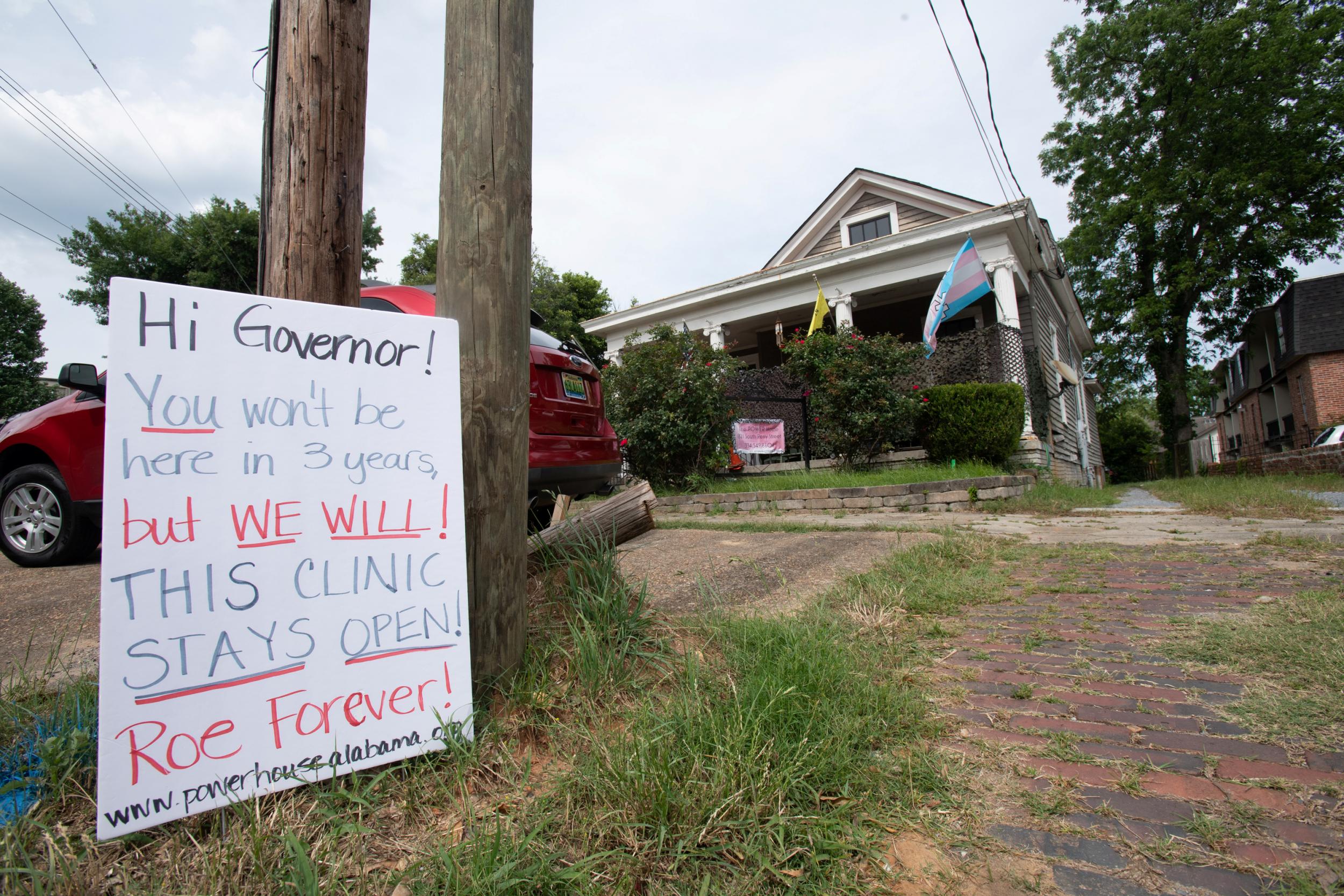
“It wasn’t consensual,” she says. “There was a video of me and – this is kind of embarrassing but it is what it is – I was walking out of the bar and I fell. I can’t even say my name. I was pretty much a deadweight at that point. I’m getting carried to my car.”
Shelby went to the doctor for a sexual health check a few days later, concerned that she might have contracted an STD. Perhaps surprisingly, she decided to confide in her evangelical Christian mother: “My mom is like the biggest Christian,” she says, smiling, “an everything-out-of-the-bible type person. I was shocked she was so supportive. If you could meet my mother you’d be like, what? That’s crazy.” Everyone expected the all-clear, but then a doctor delivered the news to both of them: “He’s like, ‘You’re pregnant.’ And my mom’s eyes are huge. She turned to me and was like, ‘What the f***?’ And I had never heard my mom use the F-word before. We didn’t speak for one or two days after that.”
Shelby’s mother eventually offered to raise the child herself. It wasn’t the first time she’d stepped in like that: “My brother got a girl pregnant very young, and they are unhappy now, almost miserable. [Their] kids have had a bad upbringing. I’ve looked after his kids for weeks in my one-bed apartment. My mom also looks after these kids a lot.” Shelby says she knew immediately that that wasn’t an option for her: “The way I look at it, my mom chose to have two kids. I didn’t want to put her through that again, for 18 years.”
After she’d decided on abortion, Shelby says, her mother was respectful and actively helpful: “She did everything. She made all the appointments, and she paid for the procedure. “I wouldn’t say my mom’s for it, but in that situation, you know, there was no heartbeat, it was so, so early. I said if there was a heartbeat then I wouldn’t do it. My conscience could not sleep if it had a heartbeat. But it was still the size of a pea, not formed at all. That was a lot of stress off my shoulders.”
Shelby’s mother drove her to a different part of the state to have her abortion, because they both knew pro-life protesters who stood outside the Birmingham clinic and would recognise them by face. They knew to be prepared for a standoff: “They tell you when you go not to get out of your car until an escort comes and gets you,” she says, referring to the volunteer “pro-choice escorts” who work alongside reproductive health clinics to try to protect the women going into them. “I don’t know if it was just a bad day if I went or something, but it was awful. The hardest part of the whole process was walking in and out.”
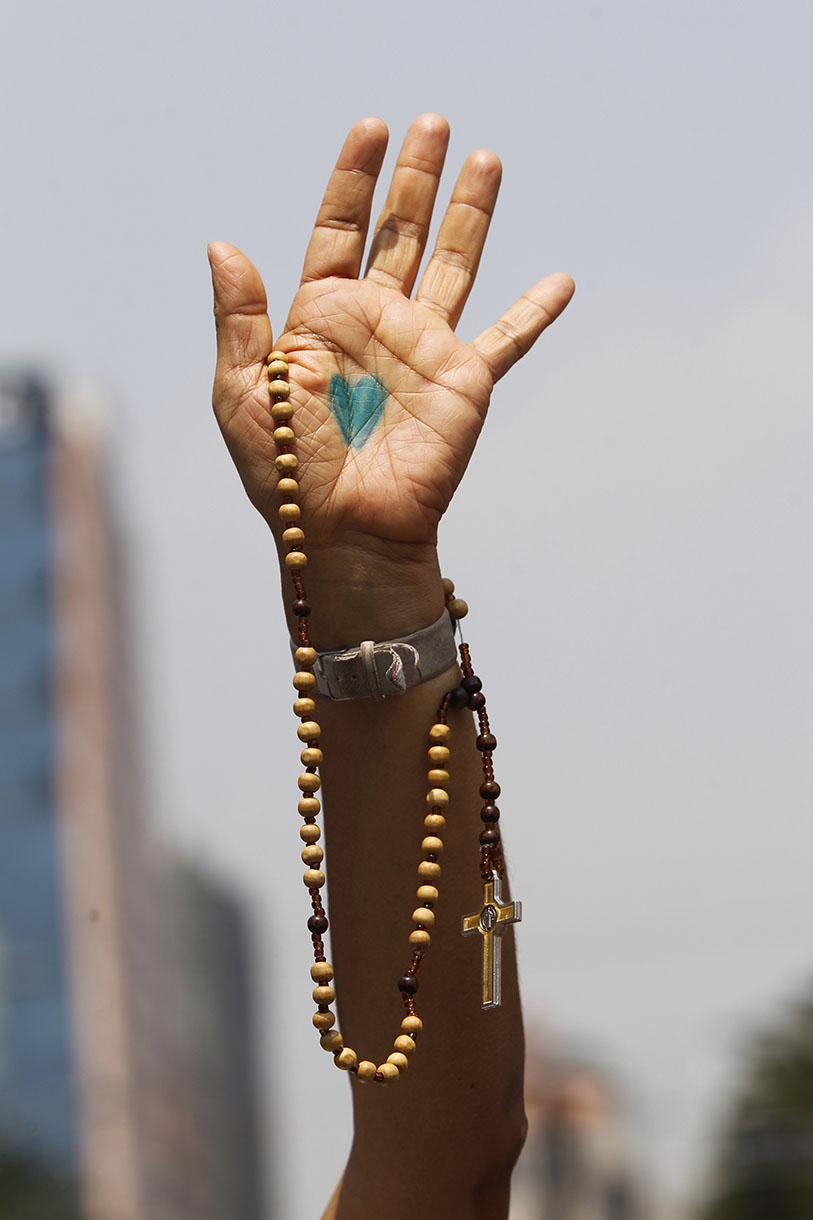
Since the abortion, Shelby says, she’s done a “complete 360” in terms of her personal views. She realised that the bible doesn’t ban interracial relationships, and she marches at Pride. She has a picture on Instagram of the pro-choice Planned Parenthood T-shirt she wants to buy. And she meets up regularly with pro-choice activists to talk about how they can fight the abortion ban, even while remaining under the radar in terms of coming out to her wider circle of family and friends.
Shelby also explains that Alabama residents aren’t just going to be banned from seeking abortions inside the state, but also from travelling outside for the procedure.
During a meeting at the Alabama headquarters of the American Civil Liberties Union or Aclu (an unmarked building, where the receptionist double-checks your booking: “I’m so sorry about this,” she says, “but we have to be really careful”), I ask public advocacy director Lucia Hermio if this is true. “It’s unclear,” she says. “The law doesn’t say exactly.”
But do women in Alabama have legitimate reason to believe they could be banned from getting abortions anywhere in the US if this bill comes into effect in November? “Yes.”
Aclu, which fights lawsuits on behalf of all at-risk groups in America whenever legislation threatens their rights, has a complicated history with Alabama. Executive director Randall Marshall tells me that since he began working with the organisation in 2013, “we’ve had multiple challenges” and they are actively fighting three legal cases at the moment. The bitter irony is that when bills like this are put forward by the state legislature, Alabama ends up paying out millions of dollars.
Lucia Hermio remembers tweeting a picture of a cheque for $1.7m which was awarded to Aclu and Planned Parenthood last time they brought a case against the state for restricting abortion rights in an unconstitutional way. That money, she says, is paid out of the pockets of Alabama taxpayers, in a state with a poor record on maternal death rates which recently voted not to extend Medicaid.
It’s not the wealthy lawmakers who suffer the consequences when governors put forward unrealistic, ideological bills; it’s everyday Alabamans. The state currently ranks 44 out of 50 in terms of child wellbeing. Almost every person in Birmingham, Montgomery and Tuscaloosa – whether pro-choice or anti-abortion – says the state desperately needs to turn its sights away from legislation and start supporting the children and parents who are already alive in their state.
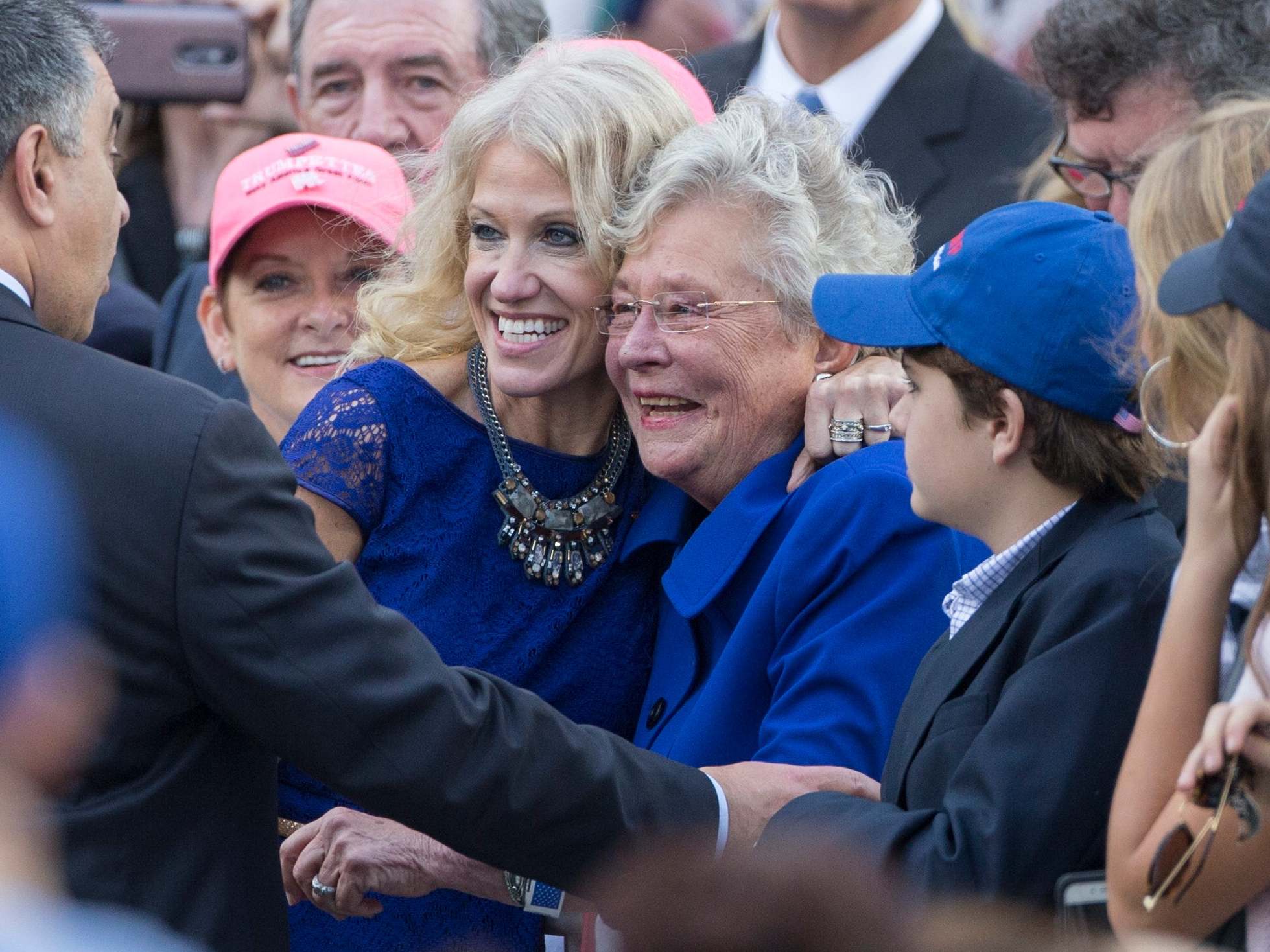
At the moment, the entire state system seems designed to penalise the poor: grocery taxes are among the highest in the nation, while property taxes are among the lowest, leading to food insecurity for a large amount of families. Usually a state would use property taxes to help fund its public school system, but in Alabama much of the schooling depends on the disproportionately high grocery tax. “Why’s that?” says one woman outside an abortion clinic in Montgomery. “Well, who owns the property? It ain’t black people.”
LaWanda Siniard is 65 and had an abortion in Alabama back “in 1987, when it was legal and safe’’.
“It’s so frustrating,” she says, “because I thought when I was young that this was all settled. I had a daughter and it was all settled. But now I have a granddaughter, and I’m worried for her. Ever since that man [Trump] got elected, it’s been getting worse and worse. People are trying to out-crazy each other.”
She says that when she had her termination, which she chose because she already had one child and didn’t want another, she “went down to Huntsville Hospital, checked myself in, checked myself out, that was it.” No protesters, I ask? “Not one.” And it was seen as a standard medical procedure. “A lot of my friends at the time had [an abortion] too,” she adds. “This madness wasn’t a thing. Well, I mean, it was a thing – but not like how it is now.”
LaWanda says that as things stand, she would leave Alabama tomorrow if she didn’t have family there. “I have family who voted for the president,” she says, sadly. “In the south, there’s this thing about macho masculinity, and he identified with that. They kind of like a straight shooter. Some people were just fed up with the government, period, and they saw him as an alternative,” but most, she believes, were part of “a backlash against having a black man as president.”
What about 2020, is there any hope? “I’m optimistic. Some of the people I know who voted for [Trump] can’t believe he’s done some of the things he did.” She thinks there’s time for “everything to turn around,” but she worries what kind of a world her young granddaughter will grow up in if they don’t.
In the college town of Tuscaloosa, an hour’s drive from Birmingham, I meet a former pro-choice escort and current staffer at a helpline which helps vulnerable women access reproductive services. Candace O’Brien, who uses non-binary pronouns, is no-nonsense, with a hearty sense of humour and a firm belief that pro-life protesters – who often refer to the work they do approaching women outside clinics as “counselling” – are dangerous.
“As a former clinic escort at the West Alabama Women’s Centre, I can tell you this, it’s not counselling, it’s harassment. They’re giving false medical information. They carry cameras. They attempt to doxx {identify} you online. In Montgomery, [well-known anti-abortion protester] David Day wears a GoPro strapped to his body and he will post sensitive information of people online.”
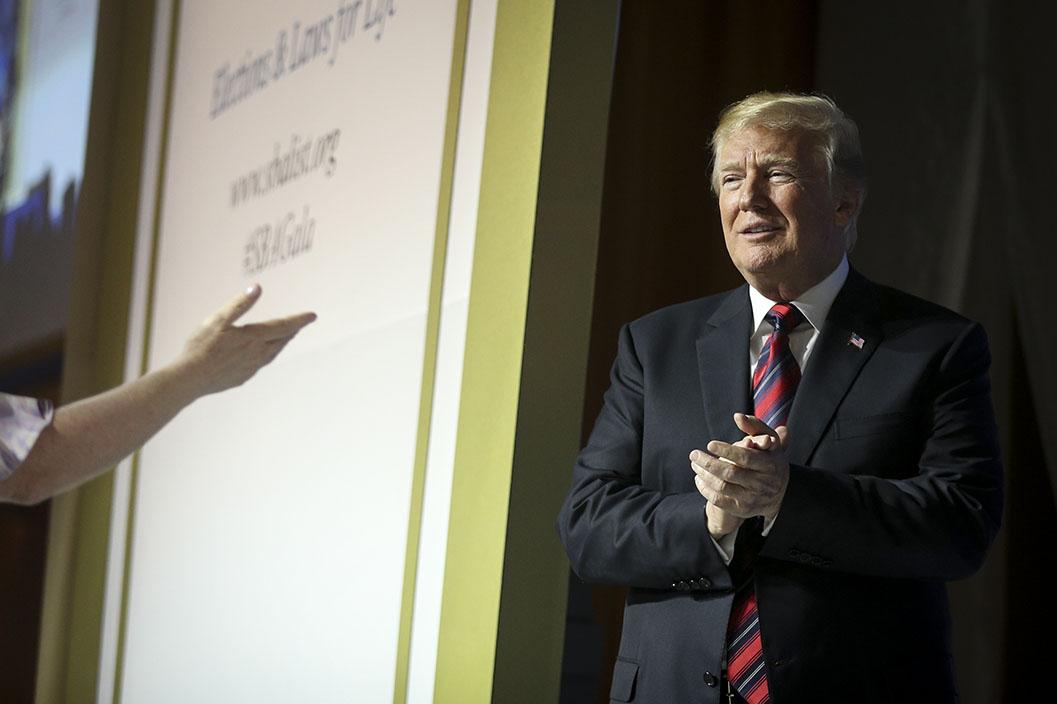
Candace says it’s not uncommon for people’s faces and information to be sent directly to employers or teachers at university. One woman who was photographed crying outside a clinic was later functionally expelled from her university: “They didn’t outright expel her, but it was a Christian college, and she was there on a full scholarship, and they took away her scholarship and her housing. That’s how they expelled her.”
Even some pro-life protesters get nervous about how hardline some of their peers can be, O’Brien adds: “In Montgomery, there was a guy sitting in a car and watching the clinic all day and it made one of the antis [anti-abortion protesters] nervous and they came to tell us about it.”
One story Candace tells stands out: it concerns a woman who did engage with the pro-life protesters outside a clinic when she was considering an abortion. It’s common for protesters to redirect people who are visiting reproductive health clinics towards mobile ultrasound vans (in Montgomery, one has the disingenuous sign “Check in here” above it) or pro-life “pregnancy clinics”.
Groups of anti-abortionists will often buy up land across the road or beside the clinics specifically for this purpose. The people in these centres, which are often given deliberately confusing names like Choices, will perform ultrasound scans and try to counsel pregnant women to keep their babies. They do not provide abortions, even though the locations of their clinics pop up when you Google “abortion clinics Alabama” and similar terms. They do, however, often promise that they will help to financially support pregnant women by providing money for pregnancy-related healthcare and supplies like nappies and baby clothes after the baby is born; some even say they provide free babysitting.
“You can exchange Jesus points or whatever,” says Candace, waving her hand dismissively. She’s referencing the fact that one clinic requires women to attend “parenting classes” to accrue points they can spend on those supplies, classes which pro-choice activists see as cynical opportunities to push an ideology.
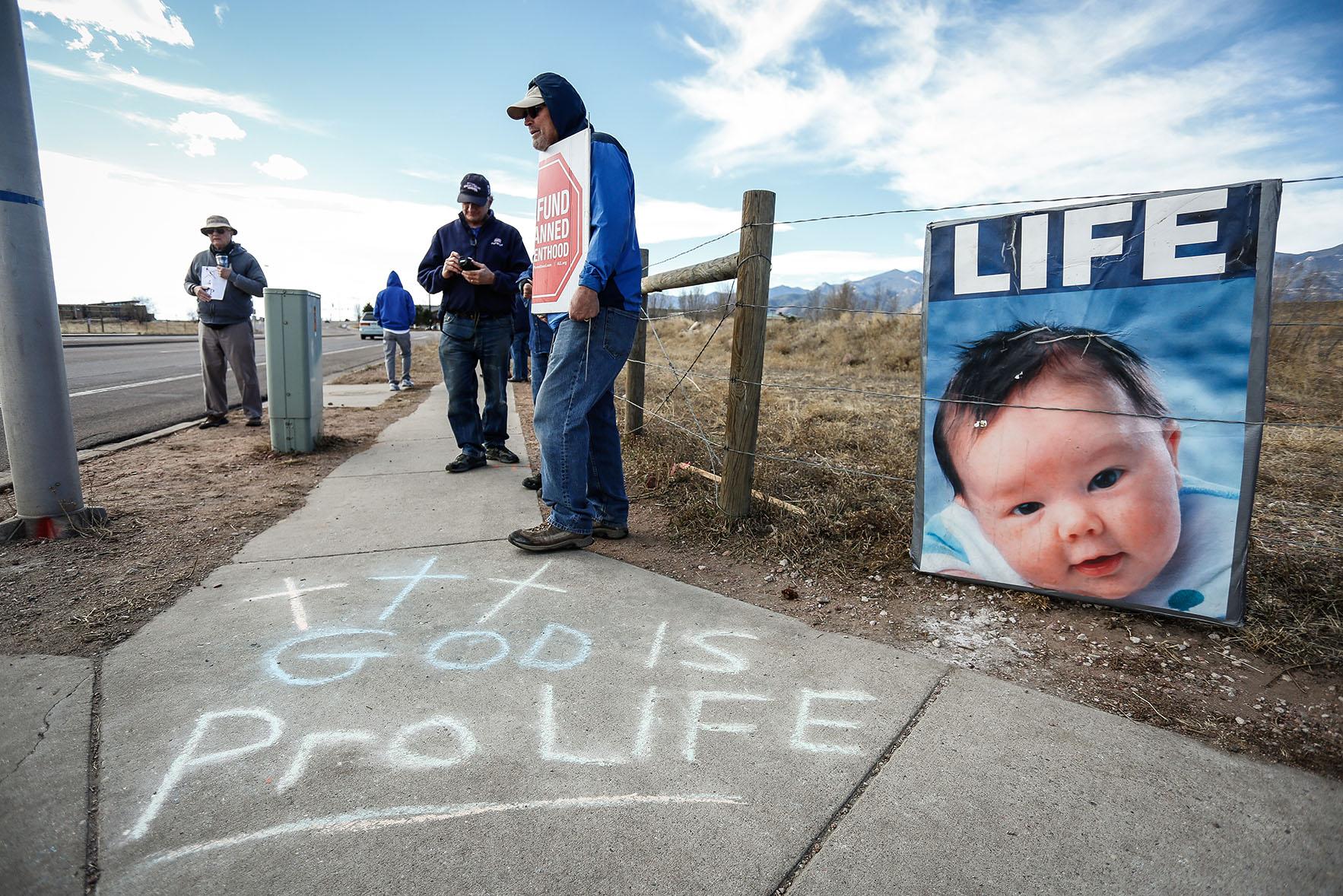
“I helped a woman when I was a clinic escort at the time,” she continues, “and the first time she came to clinic, her attention was grabbed by the protesters and she went over and talked to them. And they will tell you they’ll give you money, help you pay off your car, help you pay your insurance, and so she went to [pro-life pregnancy centre] Choices because of that.”
The woman decided to keep her baby and cancelled her appointment for an abortion – but all wasn’t as it seemed. “They stopped talking to her after a certain amount of time because she was past the state term limit and past the other states’ term limits so… they cut her off, stopped helping her entirely. She came back to the clinic with a second unwanted pregnancy a few months later and she goes back to the protesters, she breaks down crying… I think she went over to them and just went off on them about what they did to her.”
Not all pro-life protesters will approach women in this way; some are actively violent. However, Candace says many clinic escorts have genuine fears for their lives; on one occasion, she says, a pro-choice escort was deliberately hit by a car driven by an anti-abortion protester. Tuscaloosa police were called during this incident and initially recorded it as a hit-and-run, but it’s claimed by many pro-choice activists that their concerns weren’t taken seriously. No further action was taken.
In the south, there’s this thing about macho masculinity, and Trump identified with that. They kind of like a straight shooter. Some people were just fed up with the government, period, and they saw him as an alternative
En route to the Greyhound bus station in Tuscaloosa, I share a car with an Uber driver named Kimberley. Kimberley keeps a bible on her car’s dashboard, with special verses marked out with red labels. “Alabama’s laws are stupid,” she says. “Alabama is stupid.” She immediately brings up the state’s abortion ban: “This ain’t a democracy, it’s like Hitler or something. I could shoot you right now and get five years – but if I stole a car then I’d get 20 years. And if you get an abortion, it’s 40 years. Forty years! That ain’t right.”
The Alabama abortion ban doesn’t criminalise women who have abortions, though penalties are still extreme: the doctor who performs the procedure could face 99 years in prison. This is because it classifies abortion as a Class A felony in US law, meaning doctors performing the procedure face between 10 and 99 years. Even “attempted abortion” became a felony in the bill, albeit a less serious Class C (Class C felonies carry sentences of 10 to 40 years.)
A few miles away in the state of Georgia, that of the “heartbeat bill”, a woman breaking the law by getting an abortion would face a prison sentence of “not less than one and not more than 10 years”. Both states are attempting to redefine “personhood” so that it applies to a foetus. If that happens, abortion would then become the “murder” of a “person”, with the same penalties that apply for murder in the US.
Does Kimberley think a woman should have the right to choose? “Look, I’m not saying abortion is right,” she says. “Don’t quote me on saying abortion is right. But I pick up university students all the time, and they get themselves into situations or they end up pregnant, they get sexually assaulted. There’s no wonder the university has high suicide rates. Getting raped, it’s like a man murdered a part of you. And the government says, now you gotta look at that baby every day, raise that baby every day of your life, being reminded of your rapist. That ain’t right. A woman has to be trusted to choose what she wants with her own body.”
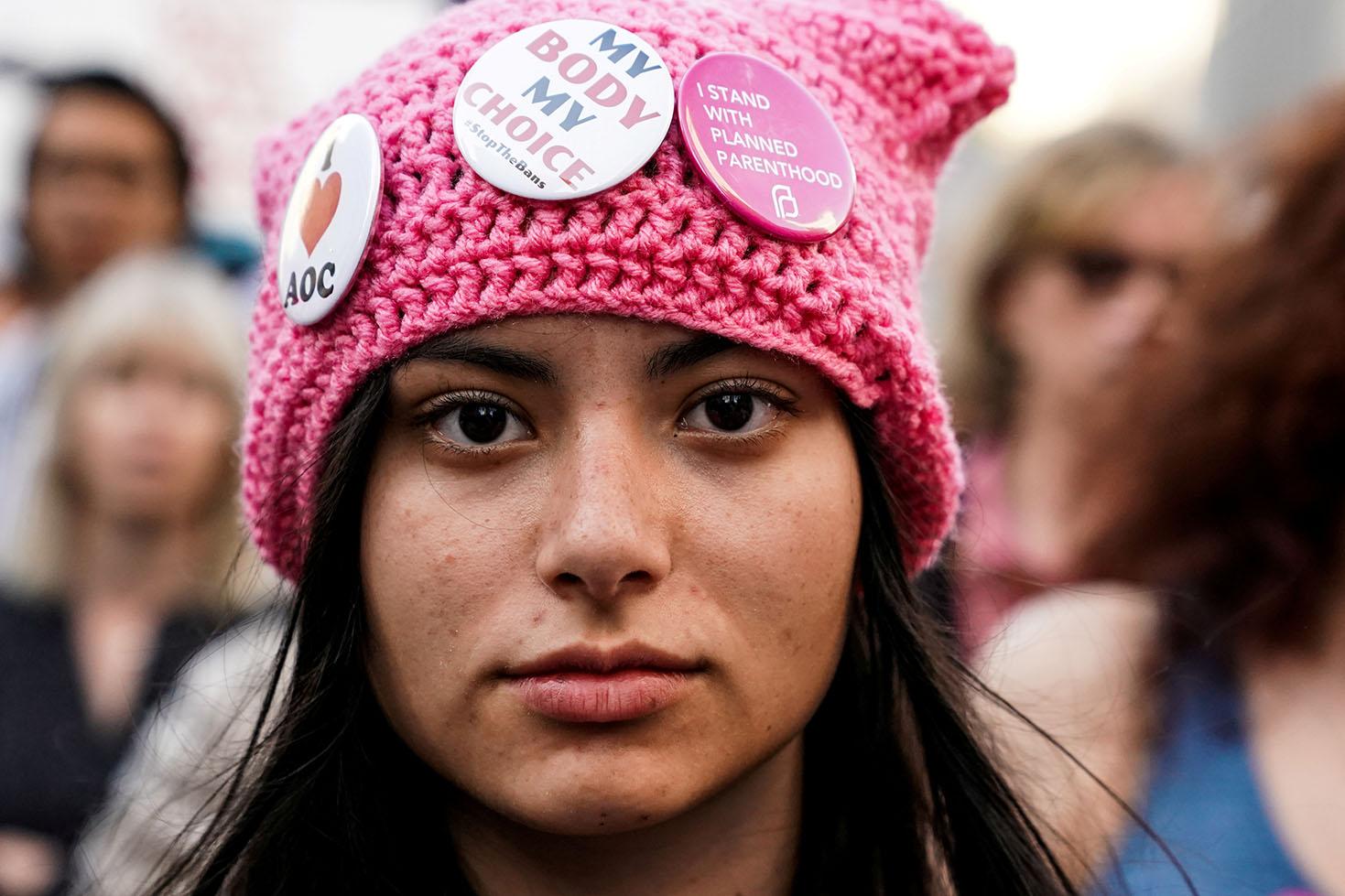
The Greyhound bus station in Tuscaloosa has a small booth inside the petrol station-cum-diner-cum-grocery store, and Kimberley needs groceries. “I can’t afford healthy food any more,” she grumbles, as she carefully picks out some fruit. “My daughter wanted plums but I had to say they’re too expensive.”
“It’s the tariffs the president did,” the woman at the Greyhound booth chimes in. “They said fruit and vegetables would go up in price. And they went way up.”
“I’m sick of him,” Kimberley says. “I’m hoping 2020 gets rid of him, or impeachment.”
The Greyhound woman purses her lips and says diplomatically, “I just hope everyone gets the candidate they want.”
“I’m sick of that Kay Ivey too,” Kimberley adds. “That law she passed the other day. He gets five years for raping you, and there’s 40 years for aborting the baby? Sick of it.”
“Yes, that’s severe,” the Greyhound woman agrees.
Montgomery is an hour and a half from Birmingham, but it feels further because of the change in attitudes. A young black man called Tony, who is “presently trying to join the military to get away”, says Montgomery is “boring” with a “small town vibe”. It certainly makes Birmingham feel like a metropolis in comparison. The house next door to my small bed-and-breakfast hotel has a protest sign permanently installed on its porch reading: “PRAY TO END ABORTION”.
Montgomery’s architecture is imposing, its residential streets lined with colourful houses where people sit and watch the world go by. The city played a central part in the slave trade and the First White House of the Confederacy, the residence of the first and last president of the Confederate States during the US civil war, stands in the centre of it, not far from the Legacy Museum, where a Maya Angelou quote is painted on the exterior wall (“History, despite its wrenching pain, cannot be unlived, but, if faced with courage, need not be lived again”) and pictures of black men in prison garb are accompanied by the message: “From slavery to mass incarceration”.
The city remains sharply divided – two white men inside a restaurant a few steps from the Legacy Museum “love Trump” – and a large Confederate flag flies on a hill by the motorway as we enter the city, with a message underneath about honouring Confederate veterans. One man in the restaurant district, dressed in a Hyundai uniform, says he voted for Trump and he intends to do so again. His name is John and his son, Chad, died of an opioid addiction. “OxyContin,” he says, while scrolling through his Facebook to reveal a picture of Chad playing guitar on the kitchen counter of a modest home. “One day his lungs just gave out.”
Montgomery is also notable as one of the only cities left in Alabama where there is a functional abortion clinic. The railings of Reproductive Health Services Montgomery are covered with black tarpaulin in an effort to keep protesters from photographing the women heading inside. A banner attached to the front of the building reads “This clinic stays open”, and a small sign in the gravel car park displays the message “Co-exist”, a common poster in the southern states intended to convey acceptance of all religions and spiritualities.
Across the road are two large billboards: “PREGNANT?” asks one in block capitals, and the second reads: “NEED HELP?” followed by the number for the “Cope Pregnancy Centre”, another pro-life organisation which aims to convince women not to have abortions, similar to the Choices centre mentioned by Candace O’Brien.
Within seconds of arriving at the Montgomery clinic just after dawn, a man approaches. “Good morning,’’ he says, handing over a pamphlet about Christianity before walking away. It’s a small, inoffensive pamphlet, with the question “What do you think it takes for a person to go to heaven?” on the front and the details of the First Baptist Church of Montgomery on the back. As he walks away, a woman sitting in front of the clinic behind two large homemade signs shouts out good morning.
“Good morning,” I say. “I’m not here to have a procedure.”
She beckons at me to come over. I’d assumed her signs were anti-abortion propaganda but in fact they are pro-choice messages: “OUR BODIES, OUR CHOICE, OUR RIGHT” reads one in red, white and blue, and the other reads: “Thou shall not force a woman to bear a child”. They are propped up by cardboard and behind them sits Janet (“just Janet, I can’t do surnames because of the situation”) on a chair she brought from home, a large silver crucifix round her neck (“I call myself a follower of Jesus these days, not a Christian, because of what people do in Christianity’s name.”)
Janet’s been sitting here with her signs every day for four weeks, ever since the abortion ban was signed by Kay Ivey. It’s hot in front of the clinic, where you’re exposed to direct sunlight at the height of the southern summer, but Janet – who looks to be in her sixties or seventies and is immaculately styled, with short grey hair, a yellow polo shirt and perfectly applied red lipstick – doesn’t intend to stop coming until the law changes.
“I’m furious at Kay Ivey,” she says, “and it’s all political. These same people holding women hostage voted not to extend Medicaid. It’s disgusting.”
Janet waves at every car and truck that flies past on the busy road in front of the Montgomery clinic; quite a few of them beep their horns as they pass by. “I get a lot of waves,” she says, “and a lot of people flipping the bird [sticking up their middle finger]. The other day, a woman was flipping the bird so furiously, pumping both her arms, that she came up on to the kerb and almost hit me. I was like, ‘Uh oh, it’s Charlottesville all over again!’ But she didn’t hit me.” She laughs and says she isn’t seriously afraid of violence – or she wasn’t until that moment.
Does she know the man was who handed me the leaflet. “Oh, that’s Donald,’’ she says. Donald walks round the block continuously, handing those leaflets to everybody. “He doesn’t shout or anything,” she says. She thinks of him as a benign protester like herself, someone who quietly maintains a vigil rather than causing trouble. The real troublemakers, she says, wait for a “big procedure day” – when a doctor comes to the city to perform back-to-back abortions all day – and then they come in their droves.
“You see the same ones every time,” she says, gesturing towards the pavement beside her. “There are about 20 people, they come early in the morning and they do a prayer circle, they do their rosaries, then they leave. Across the street comes a group which also does a prayer circle, then they sing Amazing Grace. And there’s a mobile ultrasound unit that comes and parks across the street. It says ‘Check in here’ on it, so people get confused and go over, that’s what they’re hoping.
“There’s a family which comes – I don’t know what sect they’re from, I thought they were Amish initially but it’s not that because they have electronic equipment with them, tiny handheld cameras filming the girls and things – and it’s husband, wife and child, and they stand by the parking lot with this big sign with a bible verse on it so long you can’t even read it. But I’m not gonna give them tips on how to improve their sign!”
She smiles, and pauses. “Then there’s all the ones that yell things. There’s 40, 50 or so of them. They walk up and down here, which is why they put up the tarpaulin. They just shout the most outrageous things. So the pro-choice escorts come out of that house next door and they put up all their umbrellas to try and shield the women. Because they will take pictures and put them on the internet, send them to their employers, to their schools. They’ve taken pictures of me, they get your face, your licence plate.”
There’s no wonder the university has high suicide rates… Getting raped, it’s like a man murdered a part of you. And the government says, now you gotta look at that baby every day, raise that baby every day of your life, being reminded of your rapist. That ain’t right
The house next door to the Montgomery clinic is owned by a group of pro-choice activists, the same people who come out with umbrellas and help escort women to the clinic. The porch is covered with camouflage netting and a number of flags poke out from behind it: notably the American flag, the rainbow LGBT flag and a flag with the symbols of all genders. Their windows are permanently covered, and a small sign to the side reads: “KEEP ABORTION LEGAL”.
The front of the house has a number of CCTV cameras, as well as three or four signs warning that trespassers are being filmed. This reinforced fortress is known as the POWER House, and is run by the formidable, pink-haired Mia Raven, who pulls up in her truck while Janet and I are talking. They do the same work as Candace O’Brien, in support of the people who work at the clinic and make use of its facilities.
Janet says she knows Mia well; in fact, she knows pretty much everyone on every side who frequents the pavement in front of the abortion clinic. The worst, she says, is David Day. Day has been mentioned a few times to me during my trip round the state – Candace talked about him, as did Lucia Hermio at Aclu, who said she was aware protesters such as Day are sometimes paid salaries to protest outside abortion clinics.
On Day’s website, he solicits donations from the public (“You are giving a gift to help assist with the evangelism ministry of David Day. Thank you friend”) and features a picture of the Montgomery abortion clinic with a handmade poster outside it reading: BABIES ARE MURDERED HERE. The “abortion” section of his site features a video that opens with the question, “Have you heard of Adolf Hitler?” and footage of a rally in Nazi Germany. “We’re talking about a holocaust in America, in our country, that’s sanctioned by the government,” the host, evangelical preacher Ray Comfort, says to a woman on camera.
David Day’s own words aren’t less shocking; of the Georgia foetal heartbeat bill, which he sees an inadequate, he wrote on Twitter that it “leaves it up to the abortionist to determine if a heartbeat is heard or not. That’s much like leaving ‘No means No’ up to a rapist.” He also wrote on 14 April: “61 million babies have been murdered. We think it’s good that people are afraid of pro-lifers”. His tweets are regularly interrupted by notifications that he’s entered contests to win assault rifles.
Day wasn’t available for interview because he was on a 10-day visit to spread the word about his teachings in the UK, something which a quick scroll through his social media accounts confirmed.
That gave me pause for thought.
Join our commenting forum
Join thought-provoking conversations, follow other Independent readers and see their replies
Comments